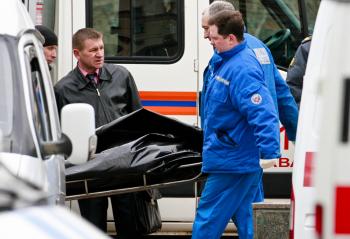Thirty-eight people were killed and sixty-five were injured when two female suicide bombers carrying powerful explosives struck in two separate attacks in the heart of Moscow on Monday morning.
Getting onto a crowded metro coach just before 8 a.m., the first suicide bomber detonated her explosives just as the doors of the train were closing.
The Lubyanka subway station is located under the headquarters of the FSB intelligence service, one of the main predecessors of the former KGB.
A second, smaller explosion took place 45 minutes later, four stops down the same line, at Park Kultury station.
The two explosions had an equivalent force of 4 to 8 pounds of TNT, and the explosive devices were filled with sharp objects to cause increased injury.
The explosions triggered confusion, anger, and alarm in Russia’s capital. Although no claims have been made for the attacks, Alexander Bortnikov, head of Federal Security Service, said he believed them to be linked to groups from the troubled Northern Caucasus region.
A state of emergency has been declared in the city, with 700 soldiers deployed on the streets, and authorities trying to find those who may be linked to the attacks. Security cameras in the metro stations recorded the two female suicide bombers being accompanied.
Russian President Dmitry Medvedev said in televised remarks that he had asked officials to increase the security in public transport nationwide. “Look at this problem on the scale of the state, not only as it applies to a particular type of transport and a particular city,” he said.
Prime Minister Vladimir Putin said that the attack was “terrible in its consequences and heinous in its manner” and that “terrorists will be destroyed.” Putin broke off an official trip to Siberia to return to Moscow.
In a statement, U.S. President Barack Obama described the assaults as “heinous terrorist attacks that demonstrate such disregard for human life.”
In a video address posted on the Internet in February this year, Doku Umarov, leader of Islamist rebels fighting for independence in Chechnya, said, “The zone of military operations will be extended to the territory of Russia.”
Umarov, who is Russia’s most wanted rebel, has also claimed responsibility for the bombing of an express train between Moscow and St. Petersburg last November—an attack that killed 39 passengers.
In 2004, the Chechen separatists also claimed responsibility for the Beslan school hostage crisis, where at least 385 people died, most of them children.
The war against Chechen separatists has officially concluded, yet numerous clashes between the rebels and Russian security forces continue.
Getting onto a crowded metro coach just before 8 a.m., the first suicide bomber detonated her explosives just as the doors of the train were closing.
The Lubyanka subway station is located under the headquarters of the FSB intelligence service, one of the main predecessors of the former KGB.
A second, smaller explosion took place 45 minutes later, four stops down the same line, at Park Kultury station.
The two explosions had an equivalent force of 4 to 8 pounds of TNT, and the explosive devices were filled with sharp objects to cause increased injury.
The explosions triggered confusion, anger, and alarm in Russia’s capital. Although no claims have been made for the attacks, Alexander Bortnikov, head of Federal Security Service, said he believed them to be linked to groups from the troubled Northern Caucasus region.
A state of emergency has been declared in the city, with 700 soldiers deployed on the streets, and authorities trying to find those who may be linked to the attacks. Security cameras in the metro stations recorded the two female suicide bombers being accompanied.
Russian President Dmitry Medvedev said in televised remarks that he had asked officials to increase the security in public transport nationwide. “Look at this problem on the scale of the state, not only as it applies to a particular type of transport and a particular city,” he said.
Prime Minister Vladimir Putin said that the attack was “terrible in its consequences and heinous in its manner” and that “terrorists will be destroyed.” Putin broke off an official trip to Siberia to return to Moscow.
In a statement, U.S. President Barack Obama described the assaults as “heinous terrorist attacks that demonstrate such disregard for human life.”
In a video address posted on the Internet in February this year, Doku Umarov, leader of Islamist rebels fighting for independence in Chechnya, said, “The zone of military operations will be extended to the territory of Russia.”
Umarov, who is Russia’s most wanted rebel, has also claimed responsibility for the bombing of an express train between Moscow and St. Petersburg last November—an attack that killed 39 passengers.
In 2004, the Chechen separatists also claimed responsibility for the Beslan school hostage crisis, where at least 385 people died, most of them children.
The war against Chechen separatists has officially concluded, yet numerous clashes between the rebels and Russian security forces continue.









Friends Read Free